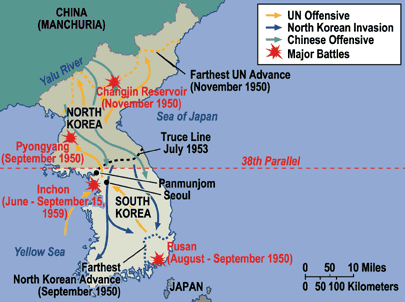
Korean War 1950-53
Causes and effects of 20th century wars
This topic focuses on the causes, practice and effects of war in the 20th century. The topic explores the causes of wars, as well as the way in which warfare was conducted, including types of war, the use of technology, and the impact these factors had upon the outcome.
Examination questions for this topic will require students to make reference to specific 20th-century wars in their responses, and some examination questions will require discussion of wars from more than one region of the world.
Causes of war
-
Economic, ideological, political, territorial and other causes
-
Short- and long-term causes
Practices of war and their impact on the outcome
-
Types of war: civil wars; wars between states; guerrilla wars
-
Technological developments; theatres of war—air, land and sea
-
The extent of the mobilization of human and economic resources
-
The influence and/or involvement of foreign powers
Effects of war
-
The successes and failures of peacemaking
-
Territorial changes
-
Political repercussions
-
Economic, social and demographic impact; changes in the role and status of women
Causes of the Korean War
On June 25, 1950, the Democratic People's Republic of Korea (North Korea) launched a surprise attack on South Korea. People in South Korea were unaware of the upcoming attack on that morning, which started a war that would kill more than 3,000,000 lives. Seoul, the capital of South Korea was quick to be captured by the North Korean troops, due to the fact that the attack had been unaccounted for.
The war had begun with North Korean leader Kim Il Song's desire to unify the peninsula under Communist rule. Before WWII, the peninsula had been one country. The UN decided to draw a line between the 38th parallel to avoid a conflict between the US and the Soviet.
However, with the Soviets occupying the northern side and the US troops occupying the southern side, the two sides became increasingly different in their giverning systems.
South Korea was aided by the UN troops and the US troops, led under McArthur. North Korea held out for as long as they could, then turned to the People's Republic of China for aid.
When the UN and US troops had managed to push the DPRK troops up to the border between Manchuria and North Korea, a desperate Kim Il Song turned to the Chinese. With the use of thousands of foot soldiers, the Chinese were able to push the UN and US troops back to the 38th parallel.
The result was a three-year war in the peninsula, the war ending in 1953 with an armistice. However some 65 years later, the two sides still remain on a war footing with no formal peace talks in sight....
Click headline above for Powerpoint outlining causes of Korean War ('The Korean War'; William Stueck - Cambridge History of Cold War Vol I
Click map below for intro to further perspectives..
Course of the Korean War

NB - Inchon should read 1950, not 1959.....:)
<. Cumings
Hammal >
Orthodoxy would have it that Korea was a Cold War conflict with the country merely a puppet at the mercy of the two superpowers as they flexed their nuclear fuelled muscles. Historians such as William Stueck, whose Cambridge History of the Cold War chapter is included below in 'Impact of the Korean War', have traditionally therefore seen the war as the result of individual nations via their leaders (Stalin, Mao, Truman) coming together and attempting to exert control over the others.
Revisionist historians however, and perhaps unsurprisingly, argue that the Korean War should be regarded more as a civil war than an out and out proxy war, certainly for the initial outbreak of fighting. Historians therefore such as Bruce Cumings and Rowena Hammal argue that there are more longer term factors responsible both for the fighting starting, what happened, and the eventual outcome of that fighting.....
Select arguments and quotes from both perspectives to help you create natural extra evidence to include which could add to your analysis of either a causes or foreign intervention q based on the Korean War.
Impact of the Korean War
So how do we analyse the Korean War? To analyse remember, we must weigh up different perspectives or themes and then reach a judgement based on what we find. To achieve this, access the googledoc on the right, and use the information in Stueck (on the left) alongside the articles beneath to complete the table and then summarise your own analysis...
(NB the article bottom right can be accessed by your JSTOR Pass...)


.png)





